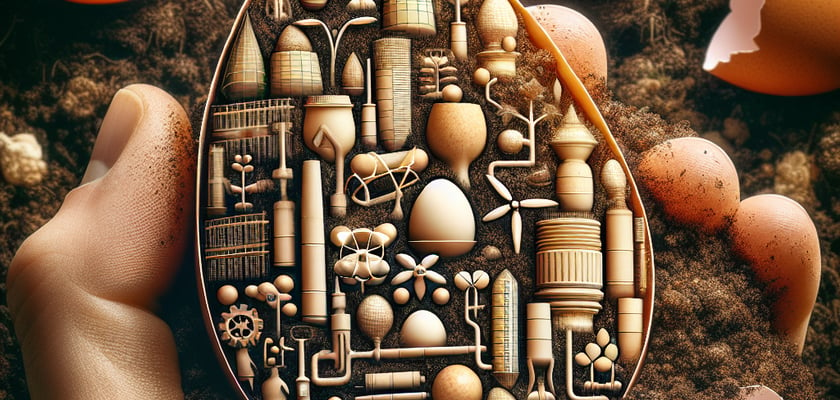Grasping the concept of egg shell gardening is a bit like cracking the Da Vinci Code, but without Tom Hanks’ hair style to distract you. Simply put, this burgeoning trend in the composting and gardening world is all about using eggshells – those calcium carbonate capsules you typically chuck into the trash after a lavish breakfast – as tiny pots or soil-enriching materials. The real magic begins when the shells break down; they whisper sweet nothings to the soil, enriching it with calcium and other essential micronutrients. And the best part? You can start picturing those cute, little crackling egg shells as the biodegradable bed where your next batch of chard or cheerful cherry tomatoes will spring up from – Mother Nature’s version of a plant incubator!
Now, don’t scramble away just yet! Up next, we’re going to whisk you through some cracking good key takeaways – you might even call them egg-ceptional insights into how these quaint, calcium-packed domes can lead to less waste and more taste in your very own green patch. We’ll uncover the shell-shocking truth about how tossing your egg waste directly into your compost bin can be like throwing a surprise party for your plants – something about nutrients and pH levels that plants just eat up. So, grab your gardening gloves, and maybe a spatula, because this next part will have you wanting to dive right into egg shell gardening like a brunch enthusiast at an all-you-can-eat buffet.
Key points I covered in this post
1. Eggshells can be used in gardening as a natural fertilizer, offering a sustainable method of recycling kitchen waste. Their rich calcium content is essential for plant growth, helping to strengthen cell walls, leading to healthier plants. When crushed and mixed into the soil, eggshells gradually release calcium, which can be absorbed by the plant roots.
2. Beyond providing calcium, eggshells can also help to improve soil structure. When added to the garden, they aid in aerating the soil, which increases its drainage capacity and allows for better root development. This is particularly beneficial for plants that require well-drained soil conditions to thrive.
3. Another advantage of using eggshells in the garden is their potential to deter pests. Slugs and snails, which are common garden nuisances, are less likely to cross an area scattered with abrasive eggshell pieces, thus protecting plants from damage without the use of chemical repellents.
4. Eggshells can be used as biodegradable seed-starting pots that can be planted directly into the soil. This practice minimizes transplant shock as young seedlings can be moved to the garden without disturbing their roots, promoting healthier and more robust plant development.
5. The practice of using eggshells in gardens is not only beneficial for plants and soil but is also an environmentally friendly way to reduce kitchen waste. Instead of discarding eggshells, repurposing them in the garden closes the loop on organic waste, contributing to a more sustainable and self-sufficient gardening approach.
What Are the Benefits of Using Eggshells in the Garden?
Eggshells contribute valuable nutrients, primarily calcium, to the soil, which helps plants develop sturdy cell walls, leading to healthier plant growth. They can also deter pests, aid in composting, and serve as a seed starting material due to their biodegradable nature.
Calcium Content and Soil Health
Eggshells are composed of more than 90% calcium carbonate, along with small amounts of other trace minerals, which are beneficial to plant growth. When crushed and incorporated into the soil, the calcium released from eggshells is absorbed by plant roots. Calcium is an essential plant nutrient that supports cell wall structure and growth, preventing disorders like blossom-end rot in tomatoes and other fruits. Over time, as the eggshells break down, they help to moderate soil acidity and provide a slow-release form of calcium that is gradually available to plants.
Eggshells as Natural Pest Deterrents
One cost-effective and eco-friendly way to protect plants from certain pests is by sprinkling crushed eggshells around the base. The sharp edges of the shells can deter soft-bodied pests like snails and slugs from reaching the plants since they avoid crawling over materials that could potentially damage their delicate bodies. Eggshells can also be used to deter larger pests like deer, which tend to avoid the smell of eggs.
Eggshell Seed Starters
Instead of discarding eggshells, gardeners can repurpose them as miniature pots for starting seeds. Filling half an eggshell with soil and planting a seed inside can create an ideal environment for the seed to germinate. The shells can be placed in an open egg carton for stability. When the seedlings are strong enough, they can be transplanted directly into the garden. The eggshell will naturally decompose in the soil, enriching it with calcium and minimizing transplant shock.
Composting with Eggshells
Adding eggshells to a compost pile is a great way to incorporate calcium into compost without the need for commercial lime. The shells also contribute to the structural integrity of the compost by providing aeration and helping to maintain the proper moisture level in the pile. It’s important to crush the eggshells before adding them to the compost to speed up the decomposition process.
The Role of pH Balance
Ground eggshells can be used to help balance the pH level of garden soil. Since they are alkaline, eggshells work best in soils that are naturally acidic and need a pH adjustment for optimal plant growth. It’s recommended to test soil pH before applying eggshells extensively, as over-application could lead to excessively alkaline conditions, which might harm some plants.
How to Prepare Eggshells for Garden Use?
- Wash the eggshells to remove any egg residue, which can attract pests or lead to unpleasant odors.
- Lay the eggshells out to dry completely to ease the crushing process and prevent mold growth.
- Once dry, crush the eggshells into small pieces using a mortar and pestle, a rolling pin, or a blender. Fine particles will decompose more quickly in the soil.
- Use the crushed shells directly in the garden soil, around the base of plants, in your compost pile, or as seed starters.
- When planting, mix the eggshells into the soil or sprinkle them on the surface around the base of the plants.
Can eggshells really benefit my garden’s soil?
Yes, eggshells can benefit your garden’s soil. They are composed mostly of calcium carbonate, which is a nutrient that plants need for healthy growth. Over time, as the eggshells break down, they slowly release calcium into the soil, helping to regulate soil acidity and provide nutrients for plants.
How do I use eggshells in my garden?
To use eggshells in your garden, start by rinsing them out to remove any egg residue. Then, allow them to dry and crush them into smaller pieces or powder. You can sprinkle the crushed eggshells directly onto the soil around your plants, mix them into the soil at planting time, or add them to your compost pile.
Are eggshells good for all plants?
While most plants can benefit from the calcium provided by eggshells, some plants, particularly those that prefer acidic soil, may not require this added nutrient. Eggshells are especially beneficial for plants that are prone to calcium deficiencies, such as tomatoes and peppers.
Do eggshells help to deter pests in the garden?
Yes, the sharp edges of crushed eggshells are thought to deter certain soft-bodied pests, such as slugs and snails, from reaching plants. However, the effectiveness can vary, and it is not a guaranteed pest-control method.
Will using eggshells attract rodents or other pests?
If eggshells are rinsed and dried properly before being added to the garden, they should not attract rodents or other pests. However, if eggshells are left with egg residue or are not properly crushed, they might attract unwanted wildlife, so proper preparation is key.
Final Thoughts
Utilizing eggshells in the garden is a simple and eco-friendly way to add essential nutrients back into the soil. It’s a perfect example of recycling natural resources to support sustainable gardening practices. Not only do they provide calcium, which is vital for plant growth, but they also contribute to a more balanced soil ecosystem and can serve as a mild deterrent for garden pests.
However, while eggshells are beneficial, they should be just one component of a well-rounded garden care routine. Healthy soil consists of a balance of nutrients, and no single amendment can provide everything a garden needs. Therefore, continue to research and employ a variety of organic practices for the overall health and productivity of your garden.

